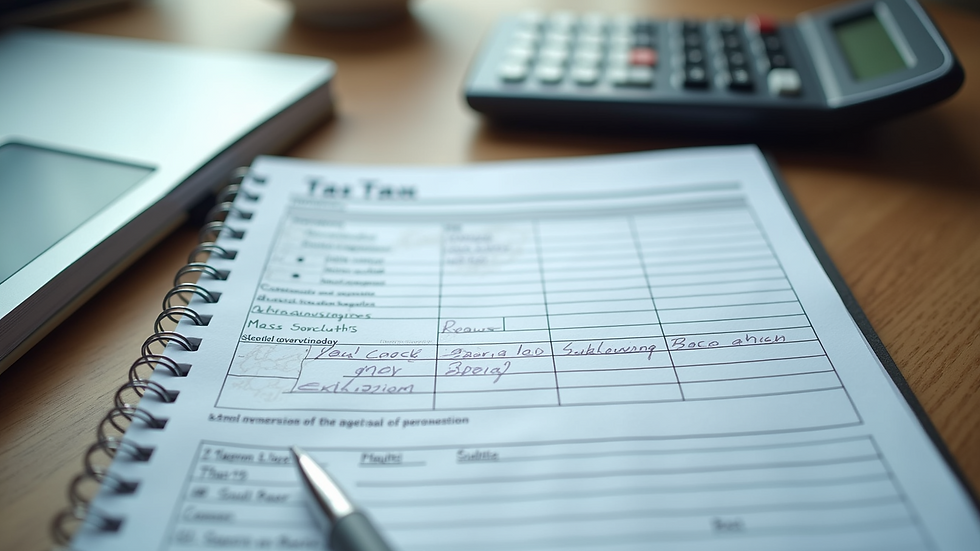Key Steps to Building a Reliable Accounting System
- gina7501
- Aug 6
- 4 min read
When it comes to managing a business, a reliable accounting system is crucial. It helps business owners keep track of their finances, ensure compliance with regulations, and make informed decisions. However, building a solid accounting system can be a daunting task. In this blog post, we will outline key steps to help you create an effective accounting system tailored to your business needs.
Understanding a Reliable Accounting System
Before diving into the steps, it's essential to understand what constitutes a reliable accounting system. A reliable accounting system accurately records and processes all financial transactions. It also provides relevant reports that help in decision-making. A strong accounting system is efficient, secure, and scalable as your business grows.

Steps to Implementing a Reliable Accounting System
1. Define Your Needs and Goals
The first step in building a reliable accounting system is to outline your specific needs and goals. Questions to consider include:
What type of business do you have?
What are your financial reporting requirements?
Who will be using the system?
By clearly defining your needs, you can select the appropriate accounting software and framework. For instance, a retail business may need inventory tracking, whereas a service-based business may prioritize invoicing features.
2. Choose the Right Accounting Software
After identifying your needs, the next step is selecting the right software. There are various accounting software options available—some are cloud-based, while others are desktop applications. Popular choices include QuickBooks, Xero, and FreshBooks.
When choosing accounting software, consider factors such as:
User-friendliness
Features
Integration options with other systems
Customer support
For example, QuickBooks offers powerful invoicing features and integration with various payment platforms, making it ideal for small businesses.

3. Determine Your Chart of Accounts
The chart of accounts (COA) is a significant component of any accounting system. It is a list of all accounts used to record transactions. Organizing your COA helps you better categorize and track your financial activities.
To create your COA:
Start with general categories, such as assets, liabilities, equity, income, and expenses.
Break down those categories into more specific accounts.
Ensure that your COA aligns with your business structure and financial reporting requirements.
A well-organized COA enables clearer financial reporting and analysis.
4. Set Up Your Accounting Processes
Once you've chosen your software and defined your chart of accounts, the next step is to develop clear accounting processes. This includes:
Establishing guidelines for handling transactions.
Defining roles and responsibilities for team members involved in accounting.
Setting up a schedule for regular financial reviews and reconciliations.
Consider implementing internal controls to reduce the chances of errors or fraud. For instance, segregating duties between those recording transactions and those reconciling accounts can be a strong preventative measure.
5. Implement Regular Financial Reviews
Regular financial reviews are essential for maintaining an accurate accounting system. Schedule monthly or quarterly reviews to assess your financial performance against the established goals. Analyze financial reports, including the balance sheet and income statement.
During these reviews, look for:
Trends in revenue and expenses.
Budget variances.
Areas for improvement.
These reviews not only help ensure the accuracy of your financial data but provide insights that can help you optimize your operations.
6. Ensure Compliance with Regulations
Compliance is an important aspect of any accounting system. Regulatory requirements for businesses can vary significantly based on location and industry. Ensure that you are familiar with laws and regulations governing financial reporting and tax obligations.
For example, in the U.S., the IRS requires specific record-keeping practices. Make sure your accounting system is designed to meet these legal obligations. Additionally, consider working with a professional accountant or consultant for complex regulatory issues.

7. Train Your Team
A reliable accounting system is only as good as the people using it. Training your team to utilize the accounting software effectively is essential. Provide comprehensive training sessions that cover:
Software features
Accounting principles
Specific processes within your organization
Make sure employees understand their roles in maintaining the system and the importance of accuracy in financial reporting. Continuous training opportunities can also ensure that your team stays updated with the latest tools and techniques.
8. Monitor and Adjust Your System
The final step is to continuously monitor and adjust your accounting system. As your business grows, your accounting needs may change. Regularly evaluate your system's effectiveness and ensure that it meets your evolving requirements.
Collect feedback from users and make necessary adjustments to enhance efficiency. This might include upgrading software, modifying accounting processes, or expanding user roles.
Final Insights
Building a reliable accounting system is not a one-time task; it is an ongoing process that requires diligence and attention to detail. By following the key steps outlined above, you can develop a system that supports your business goals and ensures financial integrity. For assistance with accounting system development, consider seeking professional advice.
Remember, a strong accounting system is fundamental to the health of your business. It empowers you to make informed decisions, track your financial health, and stay compliant with regulations. Invest the time and resources necessary to build a system that works for you, and your business will thrive.
.png)




Comments